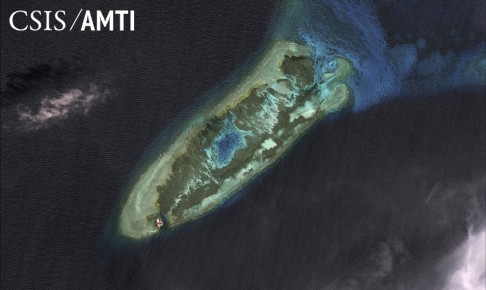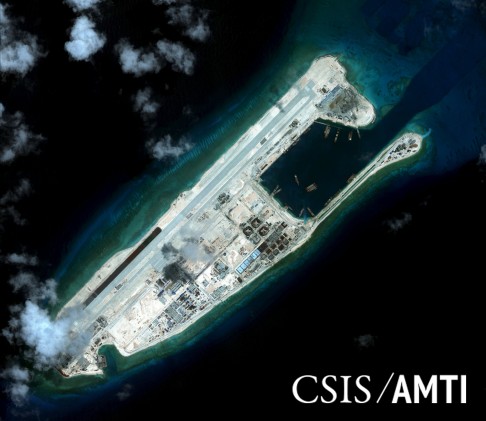US must veer away from collision course of testing China's claims in South China Sea
Mark Valencia warns of the danger of Washington giving in to rabble-rousing talk on South China Sea

US congressman J. Randy Forbes has organised a bipartisan letter signed by him and 28 of his fellow congressmen to President Barack Obama and Defence Secretary Ashton Carter, urging the US government to challenge China's purported claims to 12-nautical-mile territorial seas around its "artificial formations" in the South China Sea. The letter implies that China's actions are threatening "freedom of navigation".
Forbes chairs the subcommittee for seapower and projection forces in the House of Representatives' Armed Services Committee. Meanwhile, in the US Senate, senators from both parties, including John McCain, chairman of the senate Committee on Armed Services, said the US needs to go within the 12-mile limit to make it clear that it does not recognise China's claim that the islands are its territory. McCain said that "[not doing so] is a dangerous mistake that grants de facto recognition of China's man-made sovereignty claims".
On the contrary: these calls for what will amount to an effort by the US military to intimidate China are ill-advised and even dangerous.
China occupies at least seven features in the Spratlys - Cuarteron Reef, Fiery Cross Reef, Gaven Reefs, Johnson South Reef, Mischief Reef, Hughes Reef and Subi Reef, and has undertaken reclamation and construction on all of them.
Why is physically challenging China's claims "ill-advised"?
First, it is not clear that China does or will claim maritime zones from submerged features it has "reclaimed". Second, we do know China claims sovereignty over all the features in the South China Sea, including legal islands like Spratly, Itu Aba and Thitu that are occupied by others.
Of course, their sovereignty is disputed. Nevertheless, China could argue that the "artificial formations" are within its jurisdiction by virtue of its exclusive economic zone and shelf claims from legal islands. This jurisdiction carries with it the exclusive right to construct and regulate the construction, operation and use of artificial structures.
Such structures are entitled to reasonable safety zones around them, usually not exceeding 500 metres. China might argue that these safety zones include the airspace above them and thus explain its warnings to foreign military aircraft not to violate this airspace.
If this is not a sufficient legal reason to exercise caution, consider that Fiery Cross and Cuarteron reefs may be legal islands as well. Among the seven features it occupies, only Subi, Hughes and Mischief reefs are (or were) definitely neither islands nor rocks before its reclamation activities.
Penetration of their airspace would be a direct and public challenge to China's claim of sovereignty. Sending a warship into their territorial sea would violate China's legal regime requiring prior permission to do so.
Also, sailing a warship or flying a warplane into or over a country's territorial sea to demonstrate the right of free navigation could be construed as a threat to use force - a possible violation of the UN Charter and the Convention on the Law of the Sea - and at the least not a positive example of peaceful resolution of disputes.


However, it does not appear that these US lawmakers are concerned with the legalities surrounding these issues. They want chest-thumping action - now - regardless of the legal niceties. To them, the main purpose would be to demonstrate Washington's will to defend "freedom of navigation" and to dissuade China from any further "aggressive" actions and claims in the South China Sea.
Yet, doing so may well backfire. What if Beijing were to push back - hard? Then the US would suddenly be faced with a critical dilemma of its own making, either risk escalating a crisis, or stand down, demonstrating weakness, damaging its reputation and generating doubt about its commitment to its friends and allies.
These domestic politicians may underestimate the zeal of China's nationalist movement and the leadership's need to accommodate it to maintain legitimacy. China has publicly positioned its sovereignty and claims in the South China Sea as a matter of national dignity and redemption for its "century of humiliation". This will make it very difficult for China's leadership to back down.
So the US gambit that many are calling for could result in serious international conflict, threatening regional peace.
Is it worth the risk? Some Southeast Asian nations might not think so. Fortunately, it is clear that the US Defence Department is proceeding cautiously. According to David Shear, US assistant secretary of defence for Asia and Pacific security affairs, "freedom of navigation operations are one tool in a larger tool box that we're going to need to use".
If the US government decides to physically challenge China's claims, it is unlikely to happen until after President Xi Jinping's state visit to Washington this week. Perhaps, as head of the US Pacific Command, Admiral Harry Harris, reportedly told Philippine officials, the US is also refraining from action so as not to distract from the Philippines case at the Permanent Court of Arbitration at the Hague.
But whatever the US government does, it will not placate the bellicose anti-China crowd. They will simply find something else to harp on. It is important to recognise that, and for decisions to be driven by longer-term and larger goals. It is critical at this juncture that US decision-makers remain cool, calm, collected and courageous.
Mark J. Valencia is an adjunct senior scholar at the National Institute for South China Sea Studies, Haikou, China